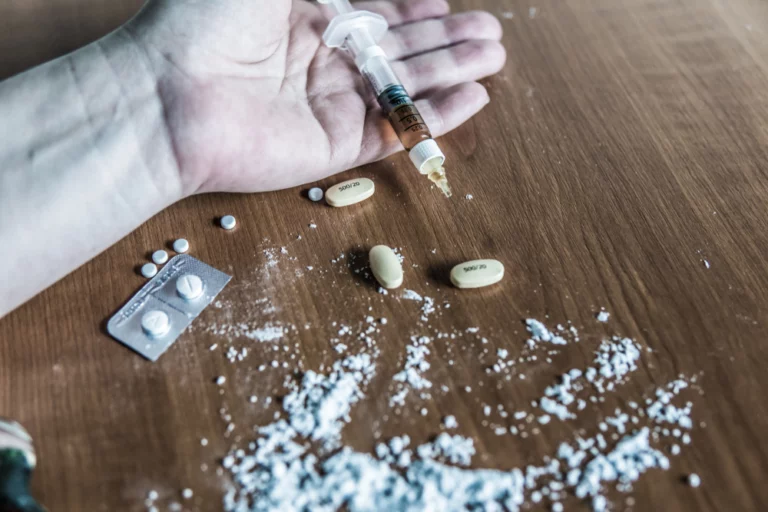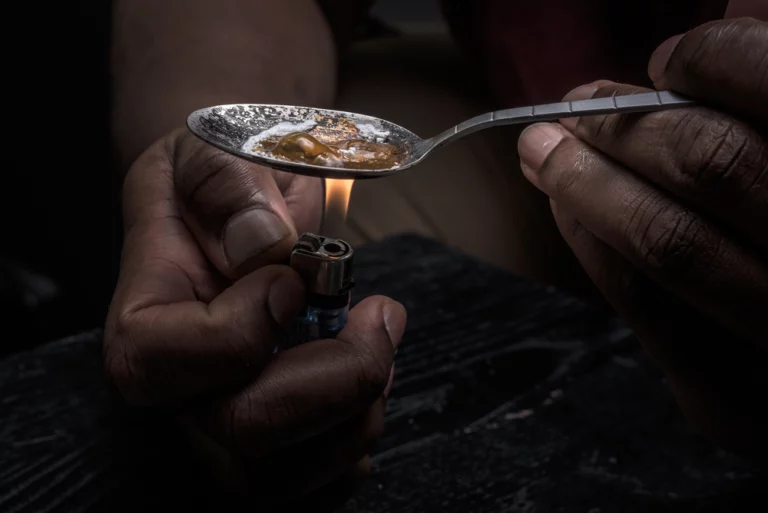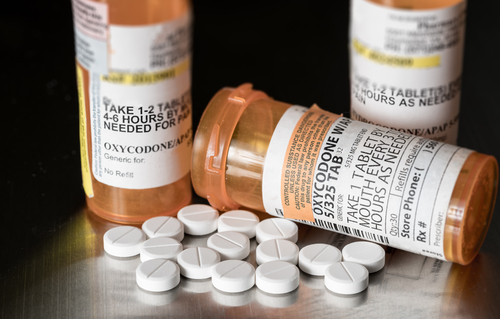How Long Does Vicodin Stay in Your System?
How long does Vicodin stay in your system? Vicodin is a medication that is commonly prescribed to alleviate moderate to severe pain. It contains a combination of hydrocodone and acetaminophen, and it works by binding to the brain’s pain receptors to reduce pain sensation. If you’ve taken Vicodin, you may wonder how long it stays in your system.
This article will discuss the factors that affect how long Vicodin stays in your system, what it’s used for, the risk factors associated with Vicodin, and provide some general guidelines.
What Is Vicodin Used For?
Vicodin is a medication that contains a combination of two active ingredients: hydrocodone, which is an opioid pain reliever, and acetaminophen, which is a non-opioid analgesic and antipyretic. Vicodin is used for many purposes and factors that cause relief from injuries and pain, including:
Pain Relief
Vicodin is primarily prescribed to alleviate pain associated with injuries, surgeries, dental procedures, and chronic conditions such as arthritis or cancer. It can effectively reduce pain and improve a person’s quality of life by making them more comfortable and able to perform daily activities without discomfort.
Cough and Diarrhea
In addition to pain relief, Vicodin can also be used to treat moderate to severe coughs and diarrhea. Hydrocodone, the opioid component of Vicodin, has antitussive properties that can suppress coughs, while acetaminophen can help to reduce inflammation and pain associated with diarrhea.
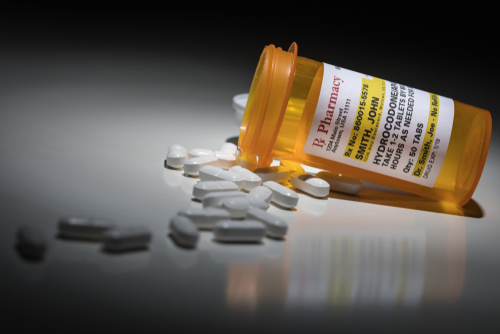
Half-life of Vicodin
A drug’s half-life is the amount of time it takes for the body to eliminate 50% of the initial dose. There is a 3.8-hour half-life for Vicodin. It takes around 3.8 hours for about 5 milligrams of Vicodin to be flushed from the body after a 10-milligram dose. This is the expected outcome assuming the person taking medicine is in good health overall.
Compared to medications with a longer half-life, Vicodin is more likely to cause dependence due to its short duration of action.
Long-term users of this medication will experience withdrawal symptoms as the substance is eliminated from the system. Vicodin withdrawal symptoms can start as early as six hours after the last dose and linger for up to 24 hours.
Risk Factors of Vicodin
While Vicodin can be an effective pain medication, it also carries several risks that people should be aware of before taking it. Here are some of the risks associated with taking Vicodin:
Dependence
One of the most significant risks associated with Vicodin is addiction and dependence. Because it contains hydrocodone, which is an opioid, it can be habit-forming and lead to physical dependence and opioid addiction. Over time, a person’s body may become accustomed to the medication and need higher doses to achieve the same pain-relieving effects. This can lead to substance abuse, which can be challenging to overcome.
Overdose
Taking too much Vicodin can result in an overdose, which can be life-threatening. An overdose can occur when a person takes more than the prescribed amount or takes the medication more frequently than directed. Symptoms of an overdose can include slowed breathing, extreme drowsiness, confusion, and even coma or death.
Other Side Effects
In addition to addiction and overdose, Vicodin can cause several other side effects, including dizziness, nausea, vomiting, constipation, and slowed breathing. Some people may also experience allergic reactions, such as swelling or itching.
Interaction with Other Medications
Vicodin can interact with other medications and cause potentially dangerous side effects. It should not be taken with other opioids, sedatives, or tranquilizers, as this can increase the risk of respiratory depression and overdose. To avoid any potential interactions, people who take Vicodin should inform their healthcare provider of all the medications they are taking.
Serious Addiction To Vicodin
To become physically dependent on a drug is to undergo physiological changes. For example, when someone takes a narcotic pain medication like Vicodin, their brain chemistry changes. The brain keeps operating as though the drug were still present even after abruptly stopping its administration. The brain must readjust and return to its original state, which takes time. If the medicine is suddenly stopped, withdrawal symptoms will appear during this period of readjustment.
A person’s current health and condition have a role in how quickly they can develop a physical dependence on Vicodin or any other prescribed drug. Although physical addiction is inevitable with sustained use of Vicodin due to the drug’s mechanism of action and the body’s response, the length of time Vicodin is consumed is the primary factor. But, under careful medical supervision, even the smallest amount can significantly relieve pain. The dosage is progressively decreased to prevent or lessen Vicodin withdrawal symptoms when the person no longer needs effective pain treatment.
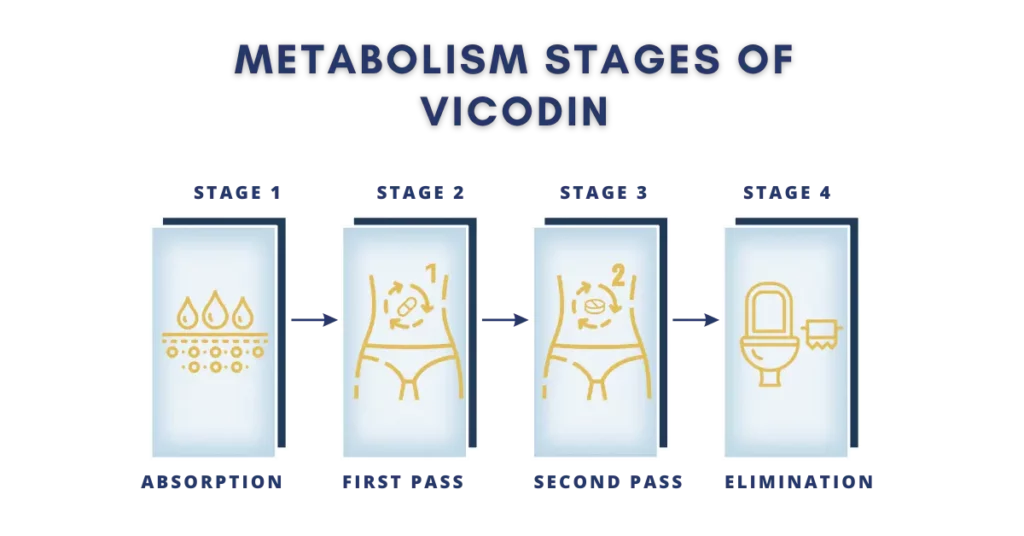
How Vicodin Metabolizes in Your Body System
Metabolism refers to the process by which the body breaks down and eliminates a substance from the body. Understanding Vicodin’s metabolization stages can help people understand how the medication is processed in the body and how long it can remain detectable.
Stage 1 – Absorption
After a person takes Vicodin orally, the medication is absorbed into the bloodstream through the small intestine. From there, it will travel to the liver, where it begins to be metabolized.
Stage 2 – First Pass Metabolism
During the first pass metabolism stage, the liver breaks down the acetaminophen component of Vicodin. The liver converts acetaminophen into paracetamol, which can be excreted from the body through urine.
Stage 3 – Second Pass Metabolism
During the second pass metabolism stage, the liver breaks down the hydrocodone component of Vicodin. Hydrocodone is metabolized into hydromorphone, a more potent opioid. The liver also converts some of the hydromorphone into inactive metabolites, which can be excreted through urine.
Stage 4 – Elimination
After metabolizing Vicodin, the liver excretes the resulting metabolites into the bloodstream, traveling to the kidneys. The kidneys then filter the metabolites from the blood and expel them from the body through urine.
How Long Does Vicodin Stay in Your System?
The amount of time it takes for Vicodin to be obsorbed, metabolized, and eliminated from the body can vary depending on several factors, including:
- A person’s age and weight
- Metabolisms
- Liver and kidney functioning
Vicodin can generally remain detectable in the body for up to 72 hours after the last dose. However, it is vital to note that specific drug tests can detect Vicodin and its metabolites for extended periods, up to several weeks after the last dose.
Urine Tests for Vicodin
Urine tests are commonly used to detect the presence of Vicodin or its metabolites in the body, as they can be an effective tool for assessing recent drug use. Urine tests detect Vicodin in the system for two to four days after the last use of Vicodin.
Saliva Tests for Vicodin
Saliva tests, also known as oral fluid tests, are another type of drug test that can detect Vicodin’s presence in the body. However, saliva tests have a shorter detection window for Vicodin compared to urine tests. The saliva test detects Vicodin in the system for twelve to thirty-six hours after the last use of Vicodin.
Hair Follicle Tests for Vicodin
Hair tests are a less common but highly sensitive method of detecting Vicodin use, as they can provide a longer detection window than other drug tests. Hair follicle tests can typically detect Vicodin in the system for up to 90 days after the last use.
Blood Tests for Vicodin
Due to their limited effectiveness, blood tests are not commonly used to detect Vicodin or its metabolites. Unlike urine and saliva tests, blood tests do not provide a reliable method for detecting Vicodin use.

Find Help At Louisville Recovery Center
Louisville Recovery Center is an addiction treatment center that provides comprehensive treatment for Vicodin addiction. We offer personalized treatment plans tailored to each individual’s unique needs, including medical detoxification, individual and group therapy, and aftercare support. Our team of medical professionals is committed to providing compassionate care and helping people achieve long-term recovery from addiction.
Do not wait to get help for a Vicodin addiction or any drug addiction. If you or a loved one are struggling, contact Louisville Recovery Center immediately to learn more about our addiction treatment programs and how we can assist you or a loved one overcome addiction and achieve long-term recovery.


